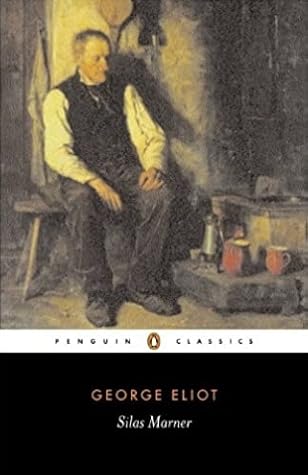More on this book
Community
Kindle Notes & Highlights
He seemed to weave, like the spider, from pure impulse, without reflection. Every man’s work, pursued steadily, tends in this way to become an end in itself, and so to bridge over the loveless chasms of his life.
orts,4 which were the heirlooms of the poor.
The yoke a man creates for himself by wrong-doing will breed hate in the kindliest nature; and the good-humoured, affectionate-hearted Godfrey Cass was fast becoming a bitter man, visited by cruel wishes, that seemed to enter, and depart, and enter again, like demons who had found in him a ready-garnished home.23 What was he to do this evening to pass the time?
Our consciousness rarely registers the beginning of a growth within us any more than without us: there have been many circulations of the sap before we detect the smallest sign of the bud.
He turned immediately towards the hearth, where Silas Marner sat lulling the child. She was perfectly quiet now, but not asleep – only soothed by sweet porridge and warmth into that wide-gazing calm which makes us older human beings, with our inward turmoil, feel a certain awe in the presence of a little child, such as we feel before some quiet majesty or beauty in the earth or sky – before a steady glowing planet, or a full-flowered eglantine, or the bending trees over a silent pathway.
The gold had asked that he should sit weaving longer and longer, deafened and blinded more and more to all things except the monotony of his loom and the repetition of his web; but Eppie called him away from his weaving, and made him think all its pauses a holiday, reawakening his senses with her fresh life, even to the old winter-flies that came crawling forth in the early spring sunshine, and warming him into joy because she had joy.
No child was afraid of approaching Silas when Eppie was near him: there was no repulsion around him now, either for young or old; for the little child had come to link him once more with the whole world. There was love between him and the child that blent them into one, and there was love between the child and the world – from men and women
We see no white-winged angels now. But yet men are led away from threatening destruction: a hand is put into theirs, which leads them forth gently towards a calm and bright land, so that they look no more backward; and the hand may be a little child’s.
The gods of the hearth exist for us still; and let all new faith be tolerant of that fetishism, lest it bruise its own roots.
and as, with reawakening sensibilities, memory also reawakened, he had begun to ponder over the elements of his old faith, and blend them with his new impressions, till he recovered a consciousness of unity between his past and present.
Perfect love has a breath of poetry which can exalt the relations of the least-instructed human beings;6 and
But there’s this to be thought on, Eppie: things will change, whether we like it or no; things won’t go on for a long while just as they are and no difference.
drives me past patience,’ said Priscilla, impetuously, ‘that way o’ the men – always wanting and wanting, and never easy with what they’ve got: they can’t sit comfortable in their chairs when they’ve neither ache nor pain, but either they must stick a pipe in their mouths, to make ’em better than well, or else they must be swallowing something strong, though they’re forced to make haste before the next meal comes in. But joyful be it spoken, our father was never that sort o’ man.
‘It’ll be different coming to us, now she’s grown up,’ said Nancy, shaking her head sadly. ‘But it’s your duty to acknowledge her and provide for her; and I’ll do my part by her, and pray to God Almighty to make her love me.’
‘I’ll say no more. Let it be as you will. Speak to the child. I’ll hinder nothing.’
I wanted to pass for childless once, Nancy – I shall pass for childless now against my wish.’
With some difficulty, after many turnings and new inquiries, they reached Prison Street; and the grim walls of the jail, the first object that answered to any image in Silas’s memory, cheered him with the certitude, which no assurance of the town’s name had hitherto given him, that he was in his native place.
‘You won’t be giving me away, father,’ she had said before they went to church; ‘you’ll only be taking Aaron to be a son to you.’
‘Yes, my dear, yes,’ said Mr Lammeter; ‘one feels that as one gets older. Things look dim to old folks: they’d need have some young eyes about ’em, to let ’em know the world’s the same as it used to be.’


